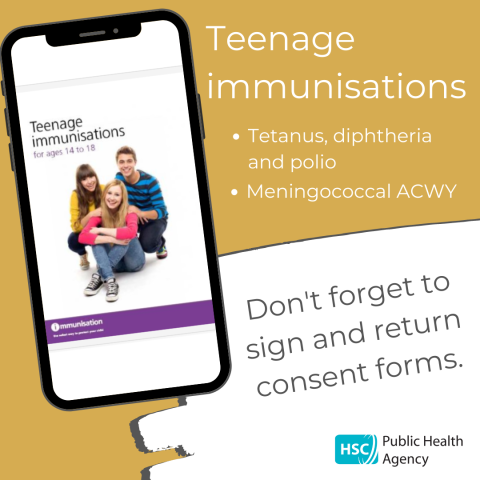Teenage immunisations are an important step in protecting your health

Getting immunisations as a teenager is every bit as important as the vaccinations that you receive as a baby or toddler, so the Public Health Agency (PHA) is reminding teenagers to make sure they complete the childhood immunisation programme by receiving their teenage immunisations.
Teenage immunisation is offered to all children aged 14-18 and is made up of two vaccines – Td/IPV and MenACWY. Teenagers will receive these vaccines via the school nursing team.
The Td/IPV vaccine used helps protect against three serious diseases: tetanus, diphtheria, and polio. There is a tendency to think of these as diseases of the past, but we must remember that before vaccines existed, these diseases killed thousands of children in the UK every year. However, thankfully they are now preventable, but only through vaccination.
Rachel Spiers, Immunisation and Vaccination Programme Manager at the PHA, said: “In total, you need five doses of the tetanus, diphtheria and polio vaccines through your childhood. This will build up and maintain your body’s own immunity against these infections and help protect you against these preventable diseases.
“You receive the first three doses as a baby, the fourth dose is given around the age of 3 as a pre-school booster, and the fifth and final dose as a teenager.”
The Td/IPV booster vaccine is given at the same time as the MenACWY vaccine. MenACWY vaccine will help protect against four different causes of meningitis and septicaemia – meningococcal A,C,W and Y diseases.
Rachel Spiers continued: “Older teenagers are at higher risk of getting Meningococcal W disease (MenW), due to them mixing with larger groups of people, making them more exposed to various infections and diseases, so you need to get vaccinated to help protect yourself. It will also reduce the risk of you carrying the bacteria, therefore offering better protection to those around you. MenW was generally rare in the UK, but there has been an increase in cases in recent years.”
Meningococcal bacteria can cause meningitis (inflammation of the lining of the brain) and septicaemia (blood poisoning), which can rapidly lead to sepsis. Both diseases are very serious and, especially if not diagnosed early, they can kill.
The early symptoms of meningococcal disease are similar to those of flu, so you need to be able to recognise the symptoms very quickly even if you have been vaccinated, as the vaccines offered through the routine immunisation programme do not protect against all forms of the disease.
Look out for any of these symptoms and seek medical help immediately if you, or someone you know, experiences them:
- Fever, cold hands and feet
- Vomiting and diarrhoea
- Drowsiness, difficult to wake up
- Irritability and/or confusion
- Dislike of bright lights
- Severe headache or muscle pains
- Pale, blotchy skin with or without a rash
- Convulsions/seizures
- Stiff neck.
Rachel Spiers ended by saying: “Please complete and return the consent form when given them in school and if you think you may have missed any of your doses, talk to your doctor or school nurse. Completing the childhood immunisation programme is an important step in protecting your health now and in the future.”
For more information about teenage immunisations for ages 14 to 18 see: pha.site/TeenageImmunisations
Since 2019 the human papillomavirus (HPV) vaccine has been given to boys and girls aged 12 to 13 years (school year 9) to protect against HPV-related cancers including cervical cancer (in girls) and cancers of the mouth, throat, anus and genitals (in boys and girls) and genital warts. This involves two immunisations. Previously HPV vaccine was only offered to girls in year 9. For further information see www.helpprotectyourself.info
